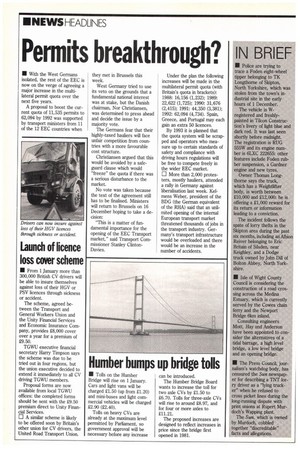Permits breakthrough?
Page 8

If you've noticed an error in this article please click here to report it so we can fix it.
• With the West Germans isolated, the rest of the EEC is now on the verge of agreeing a major increase in the multilateral permit quota over the next five years.
A proposal to boost the current quota of 11,535 permits to 62,094 by 1992 was supported by transport ministers from 11 of the 12 EEC countries when they met in Brussels this week.
West Germany tried to use its veto on the grounds that a fundamental national interest was at stake, but the Danish chairman, Nor Christiansen, was determined to press ahead and decide the issue by a majority vote.
The Germans fear that their highly-taxed hauliers will face unfair competition from countries with a more favourable cost structure.
Christiansen argued that this would be avoided by a safeguard clause which would "freeze" the quota if there was a serious disturbance to the market.
No vote was taken because the text of the agreement still has to be finalised. Ministers will return to Brussels on 16 December hoping to take a decision: "This is a matter of fundamental importance for the opening of the EEC Transport market," said Transport Commissioner Stanley ClintonDavies. Under the plan the following increases will be made in the multilateral permit quota (with Britain's quota in brackets): 1988: 16,156 (1,232); 1989: 22,622 (1,725); 1990: 31,676 (2,415); 1991: 44,350 (3,381); 1992: 62,094 (4,734). Spain, Greece, and Portugal may each gain an extra 50 licences.
By 1993 it is planned that the quota system will be scrapped and operators who measure up to certain standards of safety and compliance with driving hours regulations will be free to compete freely in the wider EEC market.
O More than 2,000 protesters, mostly hauliers, attended a rally in Germany against liberalisation last week. Kelmens Weber, president of the BDG (the German equivalent of the RHA) said that an unlimited opening of the internal European transport market threatened thousands of jobs in the transport industry. Germany's transport infrastructure would be overloaded and there would be an increase in the number of accidents.
































































































